

Autism...a word that seems to be discussed frequently these days, from news programs, websites, and on any social media site, to awareness and fundraising. You have probably heard the word autism. In 2020, the CDC reported that approximately 1 in 54 children in the U.S. are diagnosed with an Autism Spectrum Disorder, ASD (according to 2016 data).
This one word changed our life in October 2006.
Welcome to Holland by Emily Pearl Kingsley
I am often asked to describe the experience of raising a child with a disability - to try to help people who have not shared that unique experience to understand it, to imagine how it would feel. It's like this......
When you're going to have a baby, it's like planning a fabulous vacation trip - to Italy. You buy a bunch of guidebooks and make your wonderful plans. The Coliseum. The Michelangelo David. The gondolas in Venice. You may learn some handy phrases in Italian. It's all very exciting.
After months of eager anticipation, the day finally arrives. You pack your bags and off you go. Several hours later, the plane lands. The stewardess comes in and says, "Welcome to Holland."
"Holland?!?" you say. "What do you mean Holland?? I signed up for Italy! I'm supposed to be in Italy. All my life I've dreamed of going to Italy."
But there's been a change in the flight plan. They've landed in Holland and there you must stay. The important thing is that they haven't taken you to a horrible, filthy place, full of pestilence, famine and disease. It's just a different place.
So you must go out and buy new guidebooks. And you must learn a whole new language. And you will meet a whole new group of people you would never have met.
It's just a different place. It's slower-paced than Italy, less flashy than Italy. But after you've been there for a while and you catch your breath, you look around.... and you begin to notice that Holland has windmills....and Holland has tulips. Holland even has Rembrandts.
But everyone you know is busy coming and going from Italy... and they're all bragging about what a wonderful time they had there. And for the rest of your life, you will say "Yes, that's where I was supposed to go. That's what I had planned."
And the pain of that will never, ever, ever, ever go away...because the loss of that dream is a very very significant loss. But...if you spend your life mourning the fact that you didn't get to Italy, you may never be free to enjoy the very special, the very lovely things ... about Holland.
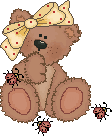

Autism (also known as Autism Spectrum Disorder or ASD) is a complex neurological developmental disability characterized by significant challenges with social interaction, communication, and restricted repetitive behaviors. Signs of Autism usually appear in early childhood between the ages of 2 and 3, but certain developmental delays can lead to a diagnosis as early as 18 months. Autism Spectrum Disorder has no single cause and there is no cure, but research shows that early intervention is key and leads to positive outcomes in life for people with ASD.
Because Autism is a spectrum disorder, each individual child will communicate, interact, behave, and learn in ways that are different from others. Learning, thinking, and problem-solving abilities will range from severely challenged or gifted. A child that is non-verbal, and that has a troublesome time learning will usually be considered severely challenged (low functioning) and will require more help in their daily lives. A child that learns quickly (high functioning) will require less help, but will have trouble communicating and adjusting to social situations.
Children with ASD might show these signs:
-
a child who doesn’t respond to their name
-
avoiding eye contact or no awareness when others are speaking
-
not understanding, sharing or taking turns
-
dislike of physical contact unless they initiate it
-
not looking at objects shown to them
-
not pointing or responding to pointing
-
no facial expressions or unusual facial expressions
-
repeating words or phrases (echolalia)
-
performing repetitive movements (rocking, hand flapping, spinning)
-
difficulty expressing needs
-
inability to play “pretend” games, preferring to play alone
-
difficulty adapting to change, or having emotional meltdowns
-
hypersensitivity to sound, smell, taste, sight, or touch
-
a need to organize or rigid behavior
-
delayed speech and language skills, or lack of gesturing
-
losing previously learned skills
In teens and adults with ASD, you might notice:
-
difficulty reading body language, facial expressions, and other social cues
-
not getting sarcasm, teasing, or figures of speech
-
speaking in a monotone voice; singsong voice
-
difficulty forming friendships and relationships
In May 2013, The American Psychiatric Association’s Diagnostic and Statistical Manual of Mental Disorders (DSM-5) redefined Autism. Under the DSM-IV-TR (the DSM-5's predecessor) the five Pervasive Developmental Disorders (PDDs): Autistic Disorder, Asperger’s Disorder, Rett’s Disorder, Childhood Disintegrative Disorder and Pervasive Developmental Disorder Not Otherwise Specified (PDD-NOS) used to be diagnosed individually by differences and intensity of symptoms. In the DSM-5, Autistic Disorder, Asperger’s Disorder and PDD-NOS were replaced by the diagnosis of Autism Spectrum Disorder. The Center for Disease Control (CDC) lists the standardized diagnostic criteria used to diagnose ASD here.


Our daughter was 19 months old when my husband and I talked to her pediatrician about an uneasiness we were feeling. We had already discussed how our little girl was achieving many of her milestones at a slower rate than most children her age. I had gone through a pretty rough pregnancy. When morning sickness struck, it stayed around for the first six months. Then, in my seventh month, I ended up with an infection and had to have emergency surgery. So, yes, we had had some unsettling thoughts. There were days when she could not be calmed down unless it was with music. She was almost two and had just started walking, but what concerned us most was how she walked - one foot flat on the ground and the other on her tip-toes. Now, I know what you must be thinking. A lot of kids walk on their toes and our son did for years. Our daughter looked like she had just gotten up on a surfboard ready to go. She was also not talking, and even though she had started walking, we had to purchase a stroller that could hold her weight limit. Since I had to walk her older brother into class in the mornings, this stroller became a life saver. Taking her to the store became a chore I did not look forward to. She would put her hands over her ears like she was in pain and cry. The time had come and it was time to talk about details and get answers.
At the next appointment with her pediatrician in December 2005, we discussed our concerns, and we all agreed that it was time to bring in a specialist. She told us that there was a possibility that our daughter had a tight heel cord and surgery could be a possibility. She referred us to Orthopedics at our children's hospital and set up our first appointment. A month breezed by and the day arrived. They performed a series of assessments and examinations, looking for any developmental irregularities. After a few visits and test results, the look on his face said it all. He knew there was nothing wrong on this end. Skye got the all clear, with full range of motion from the doctor. He then looked at both my husband and me, and his next words made me wince. He was referring us to Neuroscience and Neurology. My heart started beating faster because neuroscience has to do with the brain, spinal cord, and the nervous and muscular system. In all honesty, anything related to the brain and nervous system scared me.
We had our first appointment in early January 2006 and it went very well with the pediatric neurologist and neuro-oncologist, Dr. McGlothlin (Dr. Mac). He sat Skye down on the floor and played a series of pointer games with her. I still remember her honing in on his Winnie The Pooh stick. At our second appointment, we discussed her milestones and background. By the third appointment, we were scheduling blood tests and MRIs. I already have a fear of needles and that first appointment had me angry and in tears. The first draw was horrible. The phlebotomist collapsed both veins, and I about lost it. Sitting there watching my beautiful little girl go through everything that she was having to go through had me crying angry tears. My husband had to send me out of the room when they asked if we would like to reschedule. He politely told them no, that we were doing this today, and they had better find someone who could get a better draw. After three hours and an exceptional nurse who knew exactly how to talk to and comfort a little child, we were headed home. The day had been exhausting for all of us.
On May 10, 2006, we arrived at the hospital for the MRI at 5:00 am. That was way too early for me, and I needed over two cups of coffee. Heck, a whole pot would suffice. Skye did not understand why she had to get out of bed and leave the house. She fell back asleep in the car on the way and was still groggy when we got there. I don't really care for hospitals. Besides the emergency surgery I ended up having to have, I had been in and out of hospitals in my youth because of injuries and car accidents. Hospitals unnerved me. We had a ton of paperwork to fill out before they took Skye back. She would have to be put under because of her age. They had to make sure she was completely still so they could get the best images during the MRI.
At our next appointment, Dr. Mac explained the results. By this time, they had put Skye on a small dose of Clonodine to help her sleep at night and Risperdal for aggressive behavior. He also wanted to schedule more assessments and evaluations. By now, our daughter had undergone three straight months of testing. I knew this was extremely exhausting for her and it showed. It was during our August appointment that Dr. Mac referred to Skye as having PDD-NOS (Pervasive Developmental Disorder – Not Otherwise Specified). All I could do was sit there and listen to this doctor tell me what my child may not be able to accomplish. A Neuro-psychological assessment was scheduled.
On October 3rd, 2006, the axis of our world shifted 360 degrees. Dr. Mac told us to sit down and try to relax as he explained to us that our beautiful little girl had autism. He explained to us that our little girl had significant social and communication challenges, and language delays. He could not pinpoint where she would be in later years, but he told us that wherever she was at the age of nine was probably where she would remain. My heart literally shattered. As a parent, you have hopes and dreams for your children. I walked away from that visit with a tattered soul that day. How do you explain to your small son that his baby sister is different and she may never do things like him?



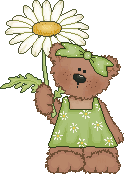

Celebrating Holland - I'm Home
(follow up) by Cathy Anthony
I have been in Holland for over a decade now. It has become home. I have had time to catch my breath, to settle and adjust, to accept something different than I'd planned.
I reflect back on those years of past when I had first landed in Holland. I remember clearly my shock, my fear, my anger—the pain and uncertainty. In those first few years, I tried to get back to Italy as planned, but Holland was where I was to stay.
Today, I can say how far I have come on this unexpected journey. I have learned so much more. But, this too has been a journey of time. I worked hard. I bought new guidebooks. I learned a new language and I slowly found my way around this new land.
I have met others whose plans had changed like mine, and who could share my experience. We supported one another and some have become very special friends. Some of these fellow travelers had been in Holland longer than I and were seasoned guides, assisting me along the way. Many have encouraged me. Many have taught me to open my eyes to the wonder and gifts to behold in this new land. I have discovered a community of caring. Holland wasn't so bad.
I think that Holland is used to wayward travelers like me and grew to become a land of hospitality, reaching out to welcome, to assist and to support newcomers like me in this new land. Over the years, I've wondered what life would have been like if I'd landed in Italy as planned. Would life have been easier? Would it have been as rewarding? Would I have learned some of the important lessons I hold today?
Sure, this journey has been more challenging and at times I would (and still do) stomp my feet and cry out in frustration and protest. And, yes, Holland is slower paced than Italy and less flashy than Italy, but this too has been an unexpected gift.
I have learned to slow down in ways too and look closer at things, with a new appreciation for the remarkable beauty of Holland with its' tulips, windmills and Rembrandts.
I have come to love Holland and call it Home.
I have become a world traveler and discovered that it doesn't matter where you land. What's more important is what you make of your journey and how you see and enjoy the very special, the very lovely, things that Holland, or any land, has to offer.
Yes, over a decade ago I landed in a place I hadn't planned. Yet I am thankful, for this destination has been richer than I could have imagined!
Our journey has been a roller coaster ride of a lifetime, but I would not trade it for anything in the world. It has had its ups and down and sometimes I just wanted to hang up the towel and walk away. LIFE doesn't work that way. As Jack Dawson says in James Cameron's TITANIC, "I figured life's a gift and I don't intend on wasting it. You never know what hand you're gonna get dealt next. You learn to take life as it comes at you."
She started school at the age of three. She learned to talk. She learned to smile. She learned to write, and her grip can actually snap a pencil in half. She learned to play and be creative. She was a cheerleader and a Girl Scout, and a Frontier Girl. She won 1st place in her school's Spelling Bee the first year they opened it to 3rd graders. She tested out of all her Special Education Classes. She made the A Honor Roll several times. She completed two years of high school in one year. She loves music and can play virtually any instrument put in front of her by ear. She considers her brother her best friend. She has accomplished so much more than what Dr. Mac could fathom! Our journey continues with God leading the way.
Our little girl has Autism and she is a beautiful brilliant blessing!!!
" I will praise thee; for I am fearfully and wonderfully made..." - PSALM 139:14 KJV
 |  |
|---|---|
 |  |
 |  |
 |  |
 |  |
 |  |
 |  |
 |  |
 |  |
 |  |
 |  |
 |  |
 |  |
 |  |
 |  |

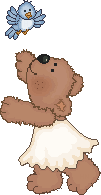

The challenging behavior of children and teenagers (and into adulthood) with ASD often cause parents and families the most stress. Sometimes the first step in trying to manage behavior is to spot what triggers it. All children can behave in ways that parents find difficult to manage, but a child with Autism is more likely to do so. Triggers come in many forms and are not always easy to pinpoint.
Children and teens with ASD often like predictable environments and can become very upset if familiar routines are broken. Our daughter is very routine driven. I remember taking another route home from school one day and she became very agitated. Vacations can also disrupt normal routines. Skye wants to be in a familiar setting and staying in a hotel is not familiar.
A child may have problems with transitioning, switching from one activity or task to another. Or, like the typically developing child, may not want to. During school, students have to change topics and immediately begin another. This was one of the main reasons we decided to homeschool. Skye needed extra time to process, more time to focus on her studies, and to actually grasp the concept of learning.
Many children have sensory sensitivities. Children with Autism can be oversensitive or under-sensitive to noise, light, touch, clothing or temperature. When children with ASD are oversensitive or over-reactive to sensory experiences, it’s called hypersensitivity. These children might cover their ears when they hear loud noises, or eat only foods with a certain texture. Our daughter has an aversion to crowds and many people talking at once. A few years ago, we went to Texas Motor Speedway and we forgot the headphones. Big mistake. There are certain foods she refuses to eat because of their texture. Her scalp is very sensitive to touch and brushing her hair is hurtful.
When children are under-sensitive or under-reactive to their environment, it’s known as hyposensitivity. These children might wear thick clothes on a hot day, or repeatedly rub their arms and legs against things. Some children have a high tolerance to pain. Our daughter has a very high pain threshold. One evening, my husband was smoking a brisket on his smoker and our daughter laid her arm across the side of the smoker. She suffered a 3rd degree burn and did not shed one tear. Another time, I was ironing a work shirt for my husband in our kitchen and our daughter was playing on the floor spinning in circles. The metal legs of my ironing board were missing the covers and somehow she managed to catch her pinkie-toe on the inside of the metal and just continued to spin in circles. I had no idea she had injured her toe until I saw blood. She cries out in frustration when her hair is brushed, yet can injure herself and not feel pain.
Sometimes children with Autism may behave in a way that you wouldn't immediately link to sensory sensitivities. A person who struggles to deal with everyday sensory information can experience sensory overload, or information overload. Too much information can cause stress, anxiety, and possibly physical pain. This can result in withdrawal, challenging behavior, or meltdowns. One year during football season in October, our cheer squad got together to go visit a Haunted House. I was apprehensive, but it was hosted by one of our girls' families in our small city, and she wanted to be with the other girls. It only took about twenty minutes to get through this Haunted House and my daughter had a death grip on my hand the entire time. She didn't make one sound as we walked through. In fact, she showed no emotion at all. A week later she began to show the effects and experience of that night. She made herself extremely sick and finally broke down and told me about the thoughts she kept having of that night. Sensory overload and anxiety had kicked in and stayed. We were allowed to do a walk through of the Haunted House with the lights on and explain how things worked, but it took months of occupational and speech therapy. As a parent, you want your child to be able to "fit in" with other kids. This event clearly backfired.
When you can identify what is triggering the behavior, changes can be made.
-
Organize predictable routines, perhaps using picture timetables. One of the best setups that I used for our daughter was PECS (Picture Exchange Communication System). Visual Stories work just as well in explaining certain situations and how things work.
-
Prepare your child for changing routines. Let them know in advance about certain events coming up, like family gatherings, cookouts, etc. PECS works well for this, too. Vacations are a change in routine as well. We planned our vacation to Maine months in advance so our daughter would know exactly when we would be there, where we would be staying, and what we would be doing.
-
Communicate clearly with your child and eye to eye. For example, make sure your child is paying attention when you explain what’s going to happen. Use only one request or instruction at a time, and use language, symbols or pictures your child understands.
-
Plan for situations you know might be difficult. For example, don’t do new things when your child is tired, or let your child take a favorite toy when you go somewhere that makes your child uncomfortable. Our daughter has a special stuffed animal that she brings with her.
-
Calmly ignore your child’s protests, but when your child is doing the right thing, give plenty of praise.

There are several great Autism Organizations and resource sites available.
OAR - Organization for Autism Research
Autism Society of America
The U.S. Department of Education
Wrightslaw
Autism Acceptance - Welcome to the Autistic Community
Autcraft - The first MINECRAFT server for kids and adults with Autism and their families.
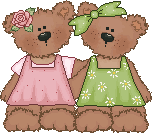
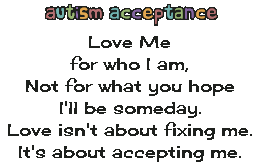

The information provided on this page should NOT be used to diagnose or treat Autism Spectrum Disorder and is NOT a substitute for professional health care.

The graphics used within this website are copyrighted to various graphic artists and are not public domain, nor are they available for download from this site. Please visit the links provided if available. Graphics © Graphic Garden and Cosmic Handmade (website closed)
